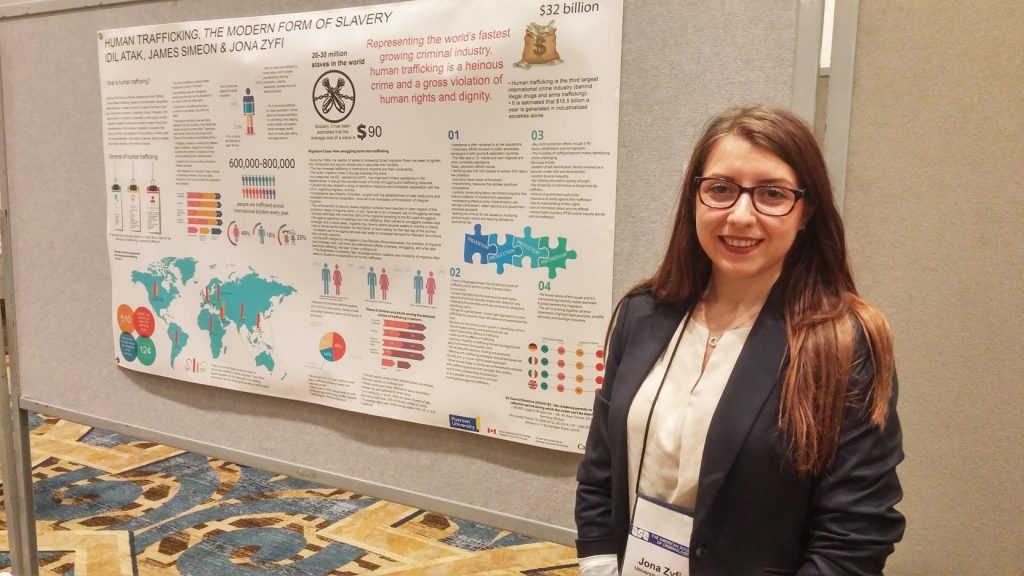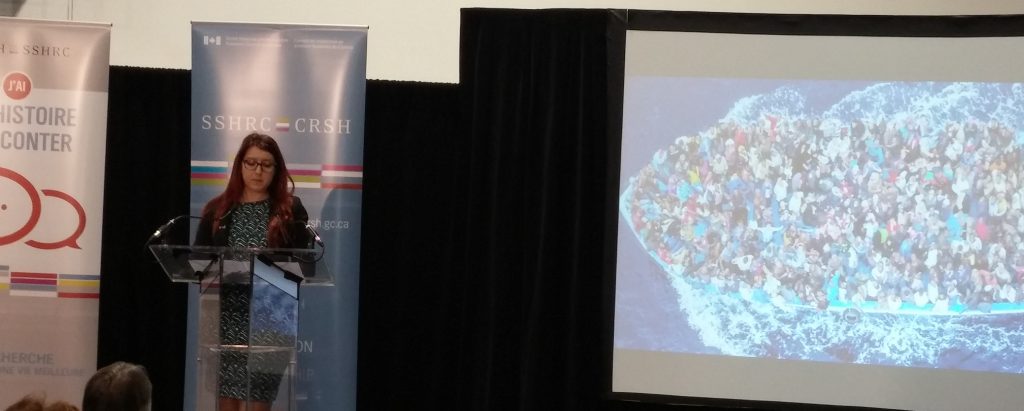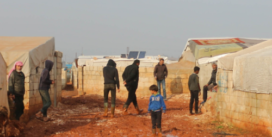- Fall Newsletter, 2025, Issue 15
- Using International Online Learning Modules to Engage Students in the Study of Critical Global Issues
- Upcoming Book Launch: Hearts of Freedom
- Announcing winners of the 2025 CARFMS Essay Contest
- The New York Declaration for Refugees and Migrants and its two Global Compacts: Addressing the Symptoms or the “Root Causes” of Forced Displacement?*
Interview for ‘Notes from the Field’: Jona Zyfi, by Madelin Burt-D’Agnillo

Interview with Jona Zyfi, by Madelin Burt-D’Agnillo
This multifaceted conversation covered considerable terrain; we focused on Jona`s commitment and research journey regarding “safe country of origin” policies, some challenges she’s encountered in the peer review process, and prioritizing self-care and mental health in student life.
Jona Zyfi is a CARFMS executive member, working at Ryerson in a Senate Policy and Appeals Administrator position, and engaged in a number of research projects regarding private refugee sponsorship, human trafficking, and ‘safe country of origin’ policies.
Madelin Burt-D’Agnillo is completing her undergraduate degree in Ethics, Society, and Law at the University of Toronto, focusing on issues of informed choice and the body. She is also a co-chair of the Trinity College WUSC Chapter.
I met Jona on a rainy March afternoon in her office at Ryerson University, which smelled deliciously like coffee. A series of ill-fated events pushed back our meeting by a week, and so I arrived with an ever-growing roster of questions, all of which Jona answered authentically and thoughtfully in the course of our conversation.
Our meeting coincided with a transition period in both of our careers, prompting meaningful reflections about next steps this autumn: Jona is preparing to leave the workforce and return to academia at the University of Toronto in a joint PhD/JD program, while I am preparing to complete my University of Toronto undergraduate program and enter the workforce. In my brief meeting with her, I was deeply impressed by Jona’s bright demeanor, her generosity with her time in service to others, and her earnest commitment to the many causes in which she is involved.
Jona works full-time at Ryerson in a Senate Policy and Appeals administrator position. She took time away from academia to gain work experience and for immigration purposes. Jona expressed a keen awareness of her situation, sharing that it’s interesting to be “living the system that I’m studying.”
Jona came to Canada from Albania to study as a high school student, although she spent most of her youth in Australia, where her family migrated during a period of instability and civil war in Albania in 1997, as refugees. Indeed, her eventual MA research into “safe countries of origin” policies in Canada and the European Union stemmed from her family’s 2005 experience of deportation when Australia deemed Albanian nationals no longer at risk of persecution.
Jona completed her undergraduate degree in Criminology with Minors in Psychology and Ethics at Ryerson University, and became involved with CARFMS in 2014 while she was an undergrad; she has since been involved in coordinating the 2015 conference, hosting workshops about mental health at graduate school, and is now working on engaging students with CARFMS as the Chair of the Student Caucus.
Jona’s passion lies in her research. Her enthusiasm was tangible and infectious as she discussed her many projects on migration. Her current focus is working with (her MA supervisor and future PhD supervisor) Audrey Macklin on a project about motivations underlying private refugee sponsorship in Canada. Jona’s role on the project is survey design and monitoring data—the preliminary findings, she eagerly shared, offer a fascinating series of rich stories about the lives of sponsors in Canada. Jona expressed being totally ‘carried away’ by the data review process; not surprisingly, then, she is rethinking the strategy for her dissertation because she wants to incorporate survey design into her PhD work.
In addition, Jona researches human trafficking with her former undergraduate professor, Idil Atak, a past President of CARFMS. Jona is designing a protocol for field work and preparing for interviews with variety of stakeholders (such as law enforcement and community organizations). Together, Jona and Idil are also updating the research Jona conducted during her masters about “safe countries of origin” and preparing that for publication through the peer review process.

I asked Jona how that process was going. It is a tedious, slow, and frustrating process, she said, particularly because data change quickly and can become less relevant before the review process is complete.
Jona shared a similar sentiment when I asked about how Canada treats refugees: the process of sponsorship is slow, tedious, and can be frustrating. While checks are important, the government could do a lot more to fast track the process, and to sponsor in greater numbers. She also expressed hope that things are getting better: that asylum seekers are being given better access to health care and judicial appeals processes, but that huge barriers to integration, such as education support and mental health resources, still persist. She is involved with LifeLine Syria, an initiative that continues to engage new sponsors and to aid in the arrival of refugee families to Canada.
As a student in the Ethics, Society & Law program, I wanted to know how Jona had applied knowledge of ethics (from her minor in undergrad) to her MA and field research. Her descriptions of ethics classes (and ethics papers!) as simultaneously enjoyable and frustrating resonated deeply with me. I found myself nodding in agreement as Jona shared that while writing her ethics papers she often found herself in a state of crisis, changing course halfway through an argument. Despite these challenges, she confirmed that scholarship is well worth it; that ethics is the foundation to everything that we do, not just in academia, but also in life. Ethics provides a valuable compass to direct us, to keep us grounded, and to remind us of our own positionality.

So what advice did Jona have for a student at the end of undergraduate studies? What advice would she have given herself as a student in the same position? In a few words, to simply ‘chill out.’ Now that she’s been working in the ‘real world’ for a while, she realized her fear that the work world would have ‘no accommodations, or compassion, or consideration by any means’ was unfounded. Her biggest advice then, is to take time for self-care, to ask for and seek help if needed.
Given the small sample size of challenges and successes that I learned about Jona in our chat, I trust that as she endures some upcoming transitions she will continue to demonstrate the same humility, wisdom, and maturity that she brings to all her pursuits!
Notes from the Field
CARFMS Notes from the Field is based on a conversation between an undergraduate student finishing their degree or a postgraduate student starting off their degree, and a more established researcher in refugee and forced migration studies. While all Notes will be different, the unifying thread connecting them is a focus on recent developments in research, law, policy, and approaches within Canada to issues of asylum, borders, and immigration. Each student will also find out if the researcher has advice to dispense to scholars at the end of undergraduate studies, and if there is one key change that we should be making about how refugees are treated in Canada. At the end of the initial run of Notes, will publish this advice together as a guide and inspiration.
If you would like to participate as either an interviewer or interviewee, please contact Dr. Stephanie J. Silverman
at sj.silverman@gmail.com or @DrSJSilverman
Advice, support, and editing will be made available, so don’t be nervous!
